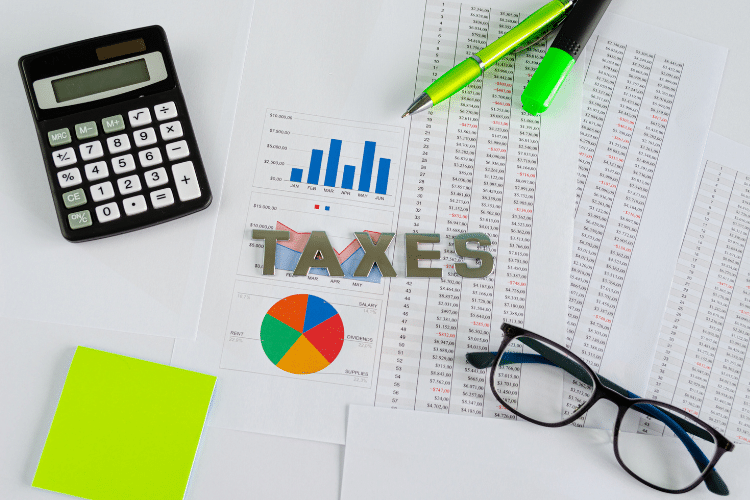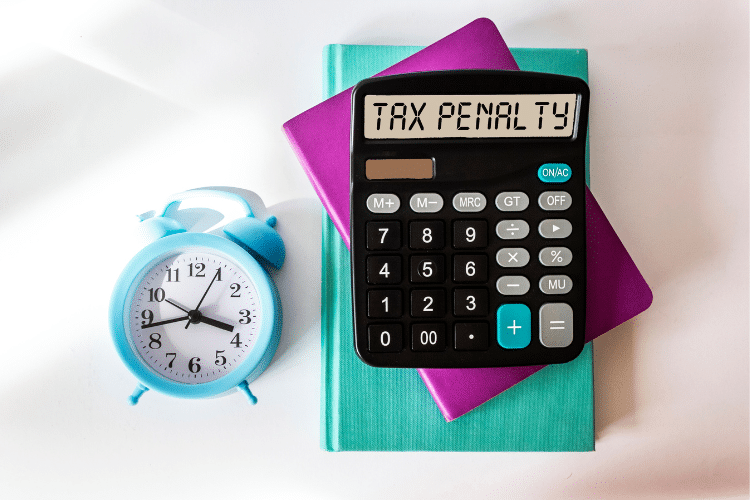Last Updated on May 19, 2025 by Maryam Siddiqui
If you’ve decided to or are considering moving to Portugal, you should familiarize yourself with the taxing system. Income taxes differ from corporate tax in Portugal. But there’s nothing you won’t able to get a grip on. Here’s our guide on filing corporate taxes, who’s liable to pay, and all the details you should know as a business owner!

Whether working independently or running a business, filing your taxes accurately and on time is crucial. Navigating the Portuguese tax system can be complex, especially if you need to familiarise yourself with the local laws and procedures. But, by familiarising yourself with the basics of filing taxes, you can ensure compliance with the law and make the process more manageable.
Stick around to know all about paying corporate tax in Portugal! Happy reading!
How is the corporate tax system in Portugal?
Here’s a brief overview of the country’s corporate tax structure.
Firstly, know that Portugal has a flat corporate tax rate of 21% on corporate profits. It also helps to know the country offers tax incentives in research and development, tourism, and renewable energy projects. These incentives help lower your tax liability.
Also, the new IFICI program benefits qualifying expats by offering tax exemptions or reduced rates on foreign-source income for 10 years. Lastly, the country’s double taxation treaties help avoid multiple taxation on your corporate income.
Let’s list some of the key definitions you should know, from which we will elaborate on the important ones:
- Corporate Income Tax (IRC): The standard corporate income tax, which has a rate of 21%, with reduced rates for SMEs. The rate for SMEs is typically 12.5% to 17%
- Tax Credits: Credits and deductions are available for certain companies, especially those that work in R&D and job creation.
- Participation Exemption: This exempts dividends and capital gains from selling qualifying participations in other companies.
- Withholding Tax: For dividends, interest, and royalties.
- Transfer Pricing: Companies engaged in cross-border transactions must use arm’s length pricing methods (fair pricing methods).
- Value Added Tax (VAT): The standard rate is 23%, with certain exceptions that lower it down to 6% and 13%.
- Capital Gains Tax: Capital gains derived from the sale of shares.
- Double Taxation Treaties: To promote international business transactions.
There’s a lot more information coming; buckle up!
- Read Also: Portugal Tax System: Easy Breakdown For Expats.
IFICI and Corporate Taxes
IFICI (which stands for Incentivo Fiscal à Investigação Científica e Inovação) is Portugal’s new tax regime introduced in 2025. Think of it as the fresh, updated version of the now-closed NHR (Non-Habitual Resident) program. IFICI is mainly designed to attract talented professionals working in areas like science, tech, and innovation by offering some pretty appealing tax benefits.
It’s not exactly a copy-paste of the old NHR; it’s more focused and a bit stricter in terms of who qualifies. Now that we’ve got the basics down, let’s talk about how this new setup can affect corporate taxes, especially for a foreigner.
How does the IFICI affect corporate taxes?
Even though IFICI is mostly aimed at individuals, it definitely has some ripple effects on corporate taxes too, especially if your business is all about innovation or focused on exports.
First off, there’s the potential for reduced corporate tax rates. If you’re running a company in Portugal that aligns with the country’s key development areas like tech, you might qualify for lower tax rates. It’s part of Portugal’s push to attract more forward-thinking businesses and make the country a hub for innovation.
Read Also: Portugal NHR Regime 2.0: IFICI – Tax Benefits In 2025.
Who is liable to pay corporate tax in Portugal?
On the surface level, legal entities and businesses have to file corporate taxes. But you must know the details of those bound to pay the corporate tax in Portugal.
Let’s break down the categories for you:
- Portuguese Companies: Whether a limited liability company or a public limited company, both must pay the tax on their profits.
- Foreign Companies with Permanent Establishments: This includes a branch, office, or factory. They have to pay the tax on the income generated within Portugal.
- Expats Running Businesses: Whether as sole proprietors or via a legal entity, expats who own and run businesses are liable to pay the corporate tax on profits from the business
It’s also wise to consult the government portal to review information on IRC and stay up to date on the tax requirements and rates.
If you’d like to understand things deeply and get a consultation, getting in touch with a Viv Europe agent is an excellent option! Whether you need to simply understand the process or avail yourself of our accounting services, we’re at your service.
Corporate tax rates in Portugal
Understanding the rates of corporate tax in Portugal is an essential aspect of taxation. We’ve compiled these below for your ease:
| Corporation | Rate |
|---|---|
| Portuguese Companies | 21% (flat) |
| Foreign Companies with Permanent Establishments (PEs) | 21% (flat) |
| PEs of foreign companies registered in the Autonomous Region of Madeira and Azores | 14.7% (standard) |
| Small and medium-sized enterprises (SMEs) | 17% (reduced) |
Also, do consider that these rates may change, so it’s advisable to research the Portuguese Tax Authority website for the most up-to-date information on tax rates in Portugal. Or alternatively, consult a tax professional.
What are the corporate tax exemptions and credits in Portugal?
As an expat, you’ll be interested to learn about the different tax exemptions and credits that may benefit you with efficient tax filing.
For example, if an expat invests in R&D, corporate tax credits can help reduce their corporate tax liability. This can, in turn, free up funds for business expansion, among other investments.
Interested to learn more? Continue reading!
Simplified tax regime
The Simplified Regime is targeted at small businesses, specifically run by expat entrepreneurs. This regime allows small-scale corporations to choose a simplified method for calculating their taxable income. The idea is to simplify the record-keeping and reduce administrative burdens.
While the regime doesn’t fully fall under “tax exemption”, it definitely lowers your taxable profits, reducing overall corporate tax liability.
Plus, if you’re running a small-scale business, the simplified regime helps you organize your financial management, which in turn may result in savings.

Corporate tax credits
These credits can really help you lower your corporate tax in Portugal. For instance, the Investment Tax Credit (IET) offers incentives to businesses investing in certain sectors or regions.
So, if you form a business in one of these regions, you can receive tax credits that reduce your overall corporate tax liability.
And tax credits for job creation and innovation are also available, which stimulate business growth. Such credits offer financial relief and promote economic development in the country. This adds to the thriving economic situation of Portugal, giving it yet another reason to attract expats.
Deductible expenses
These include costs directly related to business operations, including employee salaries, rent, utilities, and even travel expenses.
If you account for the deductible expenses, you can lower your taxable income, which would help lower your overall corporate tax bill. But remember that to avail of this exemption, you must keep detailed records and abide by the Portuguese tax regulations.
Successfully reducing your deductible expenses will lower your financial burden and also motivate responsible business practices. All these tax strategies work together to make paying corporate tax in Portugal an easier and more convenient task.
Value-added tax (VAT) in Portugal
The Imposto sobre o Valor Acrescentado (IVA), or the value-added tax, basically applies to goods and services. Its standard rate is 23% on goods and services such as dining at restaurants, electronics, and clothing.
But reduced rates of 13% and 6% are applicable on products including food, books, transportation, and even healthcare services. The reduced value-added tax rates help expats with their routine expenditures.
Portugal also has the concept of value-added tax registration. This means if your business has a yearly turnover above a specific threshold, you should register for the tax. It’s best if you find out about these thresholds from the official website.
You’ll be delighted to know that expats visiting Portugal can also claim a value-added tax refund, known as the VAT refund for tourists, on purchases made during their stay. But you’ll need to have the receipts and specifically ask for a Tax-Free Shopping form when shopping.
How to file your corporate tax return in Portugal
Filing taxes can be a hassle, but we’ve put together a step-by-step guide for you below:
- Collect Financial Records: Have all your financial documents ready, including income statements, expense records, and receipts.
- Choose a Filing Method: You can file your taxes either electronically or on paper. Most businesses opt for electronic filing through the Tax and Customs Authority (AT) website.
- Complete Tax Form Modelo 22 by the end of May every year: The form compiles your company’s financial activities and income.
- Calculate Tax Liability: You must calculate the corporate tax owed based on your profits and applicable tax rates.
- Submit the Return: Next, submit your tax return through the AT’s website if you filed it electronically or deliver the paper form to a tax office.
- Pay Corporate Tax: Finally, you’ll have to pay the tax by the deadline, which is usually December 15 of the following year.
- Keep Records: It is best to keep copies of all tax-related documents and records for at least five years in the case.
It is also advisable that expats seek professional help for filing taxes to avoid any legal mishaps, especially if it’s your first time dealing with this. Tax lawyers at Viv Europe can guide you through the process and file your corporate taxes for you.
Let’s Move to Europe
With Viv Europe your plans for Europe will come to a reality
What’s the schedule for reporting and paying corporate tax in Portugal?
Now that you’ve come this far let’s dig into the schedule for paying corporate tax in Portugal.
Knowing and abiding by the tax timeline is essential to avoid penalties, especially if you’re the one running the business. Ensure your tax liability is settled by the payment deadline to avoid any penalties. It is best to mark these dates on your calendar and organize the required documents timely to make the entire process less chaotic.
Refer to the table below:
| Phase | Deadline |
|---|---|
| Tax Year | 1st January to 31 December |
| Corporate Income Tax (IRC) Returns | May 31st of the year following the tax year |
| Advance Payments | Three installments in July, September, and December |
| Payment of Corporate Income Tax | The first installment is due by July 31st of the tax year. The second installment is due by September 30th of the tax year. The third installment is due by December 15th of the tax year. |
Does Portugal have a simplified regime for small businesses?
To answer in one word, yes. They don’t call Portugal a nest for the future for no reason!
Portugal’s simplified tax regime offers small business owners a streamlined approach to taxation. Here’s how the regime works and how it benefits you:
- Simplified Record-Keeping: Small businesses do not have to maintain complex accounting records. This reduces administrative burdens and makes it simpler for expat business owners to manage their finances.
- Lower Taxable Income: The Simplified Regime leads to a lower taxable income. It allows the legal deduction of standard expenses without requiring extensive documentation. So, it also leads to reduced corporate tax liability.
- Simplicity: The regime is pretty straightforward to navigate, so even if you aren’t very familiar with the Portuguese tax regulations, you’ll be able to work your way through.
Remember that the simplified regime only targets small businesses, so if you own a large corporation, you’ll have to navigate through other tax regimes or credits/deductions mentioned earlier.
Earnings from dividends and share capital gains
Dividends in Portugal are generally subject to a flat withholding tax rate of 28%. But if you put in exemptions like the Participation Exemption Regime, you can reduce or eliminate the tax on the qualifying dividends. This way, if you have shares in a corporation, you’ll experience significant tax savings.
Similarly, you can also benefit from the share capital gains derived from the sale of shares. So, if you hold shares in Portuguese companies, you can also benefit from capital gains through schemes like participation exemption rules. Plus, these gains can be tax-exempt, which further makes Portugal an appealing investment zone.
You may remember the mention of double taxation treaties in Portugal. These also help lower your taxable amount by reducing the chances of you being taxed twice if you have international investments.
- Also, learn about How To File Your Income Taxes In Portugal!
Corporate tax fines in Portugal
Remember to fulfill your tax obligations to avoid late filing and payment fines. As per the law, Portuguese authorities can fine you for providing incorrect information on tax returns, and the charges vary as per the degree of offense. The payable after the fine ranges from fixed amounts to a percentage of the tax owed.

In the case that you feel as if you’re unfairly fined, the Portuguese tax authority allows you space to request an appeal.
Here is a list of all the fines you could be subject to:
- Late Payment
- Late Filing
- Inaccurate or Incomplete Reporting
- Failure to Comply with Transfer Pricing Rules
- Non-Compliance with Value Added Tax (VAT) Regulations
- Tax Evasion or Fraud
Since you’re now aware of the corporate tax structure in Portugal, tax complexities should no longer stand between you and your new home. Nonetheless, it’s best to regularly discuss your tax proceedings with your tax professional from Viv Europe to avoid any complications to begin with.
Why you should consider applying for IFICI
While IFICI doesn’t offer the same level of perks the old NHR program did, it still packs a solid punch, especially if you qualify. If you’re working in science, tech, or any high-value industry, the tax benefits can be pretty substantial. It’s Portugal’s way of saying, “Hey, we want smart, innovative people like you here.”
That said, IFICI isn’t exactly plug-and-play. The rules are a bit more complex, and the eligibility criteria can get tricky. That’s why chatting with a tax pro or legal expert who knows Portuguese tax law inside and out is a smart move.
From figuring out if you qualify to filing your corporate taxes, we help simplify the whole process. This allows you to focus on building your life (or business!) in Portugal without the tax-time headaches.
Do you need corporate tax advice in Portugal?
It is completely okay not to understand the process fully. Some people have a harder time than others, and there’s nothing wrong with that.
In case you find yourself in such a situation, feel free to reach out to well-experienced tax lawyers from Viv Europe. We will guide you throughout the process, stay in touch, and ensure you understand the procedure.
There’s no room for error, and it’s better to be on the safe side. Ask other expat business owners about their experiences of filing corporate tax in Portugal through our Facebook Group – All About Portugal For Expats. Good luck!





